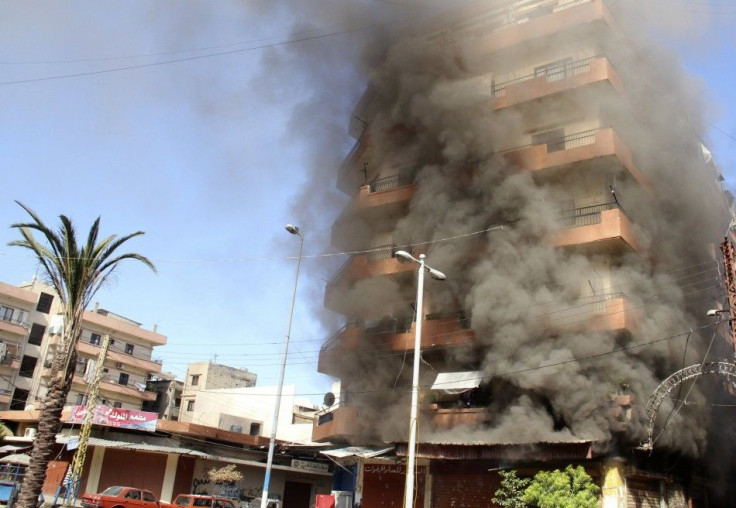Syrian Violence Spills Into Lebanon, Worsening Regional Instability
ANALYSIS

The Syrian civil war has sparked new levels of violence in neighboring Lebanon.
In Lebanon's northern coastal city of Tripoli, clashes killed at least two people and wounded 17 on Friday, according to the Associated Press.
Two neighborhoods, separated by an avenue called Syria Street, have been waging a small-scale war for days. One is mostly Alawite (linked to Shia Muslims) and supports the regime of Syrian President Bashar al-Assad; the other neighborhood is mostly Sunni Muslim, and supports the rebel fighters of the Free Syrian Army.
Ali Feddah, a 30-year-old fighter on the Alawite side, told the New York Times that he was reluctant to engage with the Sunni militants across Syria Street.
"Things are bad and getting worse," he said. "Fighting in the streets is not something we want to be dragged into."
In Syria, rebels have been fighting to overthrow Assad's oppressive regime since March of last year. The loosely organized Free Syrian Army has struggled against the formidable military; about 20,000 have lost their lives so far, and 200,000 Syrians have fled the country.
The fighting in Lebanon is not only influenced by Syria; it leaks across borders in both directions. Many Free Syrian Army rebels seek refuge in Lebanon only to find themselves battling Alawites there, while many Lebanese fighters rush across the border to bring more firepower into Syria's hardest-hit cities.
This may work in favor of the Syrian regime, and there are concerns that Assad is behind some of the recent surges of violence in Lebanon.
These fears were heightened by the recent arrest of a Lebanese government minister, Michel Samaha, who was accused of transporting Syrian explosives into Lebanon to use against Sunnis who support the Syrian rebels.
Boutros Harb, a pro-Western Lebanese politician who recently survived an assassination attempt, told The New York Times this week that Assad could be sending a message by intervening in Lebanon.
"Assad is trying to say to the world, when Syria is destabilized, the region will be, too," he said. "It's him asking: Are you capable of handling this regional chaos? And if you're not, protect my regime."
To say that Lebanon has always been closely linked to Syria is an understatement. The two were a single territory under Ottoman rule before World War I. The French then won a mandate over Lebanon, separating the territory from Syria before granting its independence in 1943.
After winning sovereignty, Lebanon did not lose its connection to the West. Its relative stability, central location and thriving banking system attracted international tourists and foreign investors. The capital city of Beirut was known as the "Paris of the Middle East."
But sectarian conflicts were bubbling beneath the surface, and these escalated to a boil during the 1970s.
The 15-year Lebanese Civil War -- a conflict between Christians, Sunnis, Shias and their international proxies in Israel, the Palestinian territories, Syria and elsewhere -- began in 1975. Lebanon's infrastructure and economy were devastated, and tensions between different religious, ethnic and political groups have heightened considerably.
The war was effectively ended by a massive Syrian offensive in 1990, and tens of thousands of Syrian troops remained in the country until 2005. Hezbollah, a civil war-born Shia militant group that today is allied to Syria and Iran, still wields considerable power in Lebanese society, especially among the Shia population.
During the war and subsequent occupation, Syria gained both strong supporters and vehement critics in Lebanon. There have been sporadic conflicts all over Lebanon since 1990, and many of these clashes pit Sunnis with Western ties against Syria-allied Shias.
Now Syria's own civil war has made those clashes even worse. Assad belongs to the Alawite religion, an offshoot of Shia Islam. And so the clashes in Tripoli on Friday parallel those that have been raging in Syria for 17 months: majority Sunnis against Shia regime sympathizers.
Abu Hamad, a 45-year-old commander of Sunni militants in Tripoli, told The New York Times that his aims had everything to do with the battle in neighboring Syria.
"This will only end when the Syrian regime falls," he said. "We are waiting for Assad to go; he's the head and when he's gone, the tail will die as well."
With strong animosities on both sides of this battle, it is doubtful that Lebanon's recent rise in violence would end with the fall of Assad. After two decades of fragile peace, Lebanon is at risk of once again becoming a volatile flashpoint at the hub of regional conflicts.
© Copyright IBTimes 2025. All rights reserved.






















